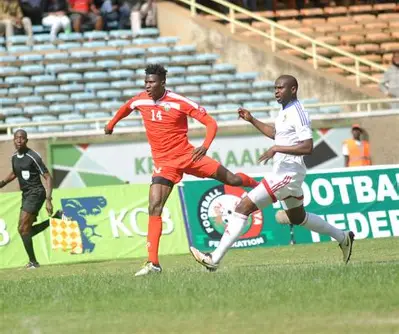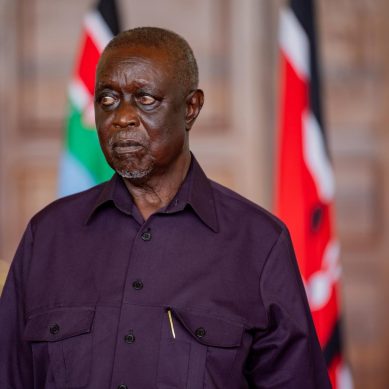
And so another season ends with another day of reckoning in the Premier League, with the title race still alive on the final day.
The trophy will be dispatched to Manchester, adorned in the now-familiar sky-blue ribbons, but a replica will be sent to north London, complete with red ribbons, just in case a dramatic late twist sees Arsenal crowned champions for the first time in 20 years.
It is a fascinating prospect for neutrals, never mind those of an Arsenal persuasion. But realistically, we all know how this ends:
- Manchester City beating West Ham United at the Etihad Stadium to secure their sixth league title in seven years and a record-breaking fourth in succession
- City captain Kyle Walker hoisting the trophy skywards under a shower of blue ticker tape, with Premier League chair Alison Brittain standing there awkwardly on the podium and chief executive Richard Masters relieved that he got to spend the afternoon at Arsenal instead
- “Lance Armstrong” and the number “115” trending on social media for the next 48 hours
- Pep Guardiola expressing shock and disdain in his post-match press conference when someone dares to mention the elephant in the room
The City success story has become… complicated.
How could it not be complicated when Sheikh Mansour’s ownership of the club has been described by Amnesty International as “one of football’s most brazen attempts to ‘sportswash’ a country’s (the United Arab Emirates’) deeply tarnished image through the glamour of the game”? How could it not be when the Premier League has referred City to an independent regulatory commission over 115 alleged breaches of its financial regulations over a period spanning nine seasons?
Over the nine years under investigation, City won three Premier League titles.
They won a fourth, fifth and sixth in the four years it took between the Premier League launching an investigation into the matter (first raised by the German magazine Der Spiegel in 2018) and, after overcoming a series of legal hurdles, referring it to a regulatory commission.
They won a seventh last season, three months after the charges were brought against them. They are overwhelming favourites to win an eighth before the as-yet-unspecified point at which Masters insists a regulatory commission will finally hear the case.
And it is such an enormously complicated case – not as straightforward as Everton’s and Nottingham Forest’s PSR breaches, as much as some might like to equate them – that few people would be surprised if City win a ninth league title before the whole thing is resolved one way or the other.
One year on, why have Man City’s charges not been dealt with?
All of this is damaging for the Premier League brand. How could it not be when its dominant club of this era has had these allegations hanging over them for so long? Whether your view is sympathetic or hostile to City, what does this situation say about the Premier League and – a hot topic these days – its ability to regulate its clubs and its competition?
It is also damaging for City. Their chairman Khaldoon Al Mubarak admitted as much last June, saying that the way the club has been “characterised” over the initial allegations and the subsequent charges “is very frustrating because it takes so much from the great work that’s happening at this club”.
It does. Without question, praise for City’s achievements is tempered by the allegations that have hung over the club for so long.
There is always that caveat, the accusation that none of this – this phenomenal group of players, under this phenomenal coach, hired by a phenomenal sporting operation – would be possible without rules being broken along the way.
City have disputed the context of the emails published in Der Spiegel, but not their veracity. Above all, they have challenged the legitimacy of the case against them, claiming the club has faced an “organised and clear attempt to damage (its) reputation”.
The club’s reputation has been damaged without question. Even when they successfully overturned a two-season ban from UEFA competition in 2020, the verdict from the Court of Arbitration for Sport (CAS) did not make pleasant reading.
Some of the charges against City were not established, but others were merely time-barred. The contents of the controversial emails were not disputed. They were accused of a “blatant disregard” for UEFA’s investigation, found guilty of not cooperating with UEFA by failing to provide substantial amounts of evidence and fined £8.8 million ($10.1m).
They did not prove, as Guardiola claimed last year, that “we were completely innocent”. But should that affect anyone’s view of the team? Is it possible to differentiate the ownership, the management at executive level and the football team? Is it possible to have serious concerns about a) sportswashing and the growing phenomenon of football clubs used as geopolitical tools, and b) the alleged financial breaches, while also holding a deep admiration for Guardiola and a group of players who have scaled such extraordinary heights over the past seven seasons?
When you make such a suggestion, you tend to annoy pretty much everyone.
Question the club’s financial arrangements, or whether it is healthy for a club to be owned by the UAE’s vice-president and you find yourself accused of an agenda against the club or even against the Middle East. Hail City’s brilliance and you are accused of being a shill for their owners. Do both – even at the same time – and the flak comes from both sides.
But how can you not admire Guardiola and a group of players who, over the past seven seasons, have reached levels of consistency and brilliance arguably unmatched in English football history?
It’s not just the number of league titles. It’s the number of goals, the number of wins, the number of points – and in an era when, thanks to its unrivalled commercial and financial strength, the Premier League has finally lived up to its long-beyond claim to become the strongest in Europe.
And beyond the pure numbers, it’s the technical brilliance and ingenuity of their football.
- The Athletic report







